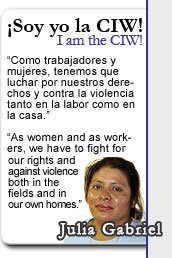2012 Northeast Tour: Boston
April 12, 2012
 At Stop & Shop Headquarters yesterday, the rainy Thursday workday in quaint Quincy, MA began like any other. But around midday, in the town named for president and abolitionist John Quincy Adams, the quiet rhythm of sloshing cars was interrupted by the voices of ten CIW members, who, after two 16-hour days of driving from Immokalee, emerged from their van set to sacrifice ten days of work and pay in order stand with the other tens of thousands of Florida farmworkers who pick Stop & Shop’s tomatoes. |
 One-by-one, they were joined by Fair Food allies — students, people of faith, workers, consumers — who had taken several hours off work and school to brave the rain and travel out to suburban Quincy until they reached 80 voices strong. |
 They came together to deliver a message, a message so simple that teacher Chris Hoeh of the Cambridge Friends School said his second-graders had explained it in their hand-crafted signs. One read: 32 pounds + 2.5 tons = $50 = bad pay. |
 He shared a poem one second-grader had written after the CIW visited their classroom:
(Check out the incredible hand-made signs on the wall behind the CIW presenters. As anyone who spends five minutes with a child quickly learns, children are born with an innate sense of justice and fair play. The unfortunate thing is how, for so many of us, life dulls and distorts that perfect vision.) |
 The young poet's sentiment was echoed at the rally outside Ahold's headquarters by Chef and restaurant worker Alex Galimberti of Chefs’ Collaborative, who shared his expert opinion that a tomato’s rich flavor can only be fully appreciated when its harvester is treated with dignity and respect. And, really, who can argue with a man whose toolkit is a satchel of finely sharpened knives?... |
 In a dramatic illustration of what “dignified treatment” implies, the ten CIW members then performed a self-written theater piece right there on the sidewalk. In Act One, when an Ahold representative visits a field to "audit" for supply chain abuses through their Standards of Engagement, the farm quickly pulls out their shade tent and ensures that there is ample water at the workers’ disposal. The moment the Ahold representative leaves, however, it's back to the usual (above): forced over-filling of buckets, verbal abuse, the constant threat of being fired upon complaint. The Ahold way promised no real verification, no enforcement, no farmworker participation... |
 Act Two stood in stark contrast to the first scene. Now, as a participating buyer in the Fair Food Program, Ahold is assured of fair farmworker treatment through the audits and investigations of the Fair Food Standards Council, the new, independent monitoring body enforcing rights in the most extensive oversight of a code of conduct that the agricultural industry has ever seen. Worker-to-worker education sessions begin building consciousness among farmworkers of their new rights, empowering them to serve as tens of thousands of round-the-clock monitors, the pivotal ingredient to fulfilling the promise of a complaint resolution system that can, at any moment, trigger a swift, market response to intolerable abuses. |
 The actors produced laugh after laugh, but as Act Two closed, smiles faded: For decades, Ahold and its Standards of Engagement have stood by in mute complicity, while sexual harassment, abuse and slavery continued unabated -- and unchallenged by the corporate buyers of Florida produce -- in the fields. |
 And then, just at that moment, a man emerged from the double doors of the towering Stop & Shop headquarters, behind the representatives standing watch, and approached the group. “I'm a systems analyst from floor six—and I support you.” His expression was determined, unflappable. “May I escort you inside for a conversation on floor ten with executives?” |
 Surprised and hopeful, the group elected a delegation to accompany him and set off towards the entrance. But they never got to floor ten, or even to the door. Despite the cold, driving rain, the group was made to remain outside as workers explained to the Stop & Shop representative the dire implications of Stop & Shop’s refusal to join the Fair Food Program. |
 Standing beside the systems analyst (on left in the black windbreaker), Rabbi Barbara Penzner of Temple Hillel B'nai Torah (right) spoke to the Stop & Shop representative of what she had seen during her travels to Immokalee with Rabbis for Human Rights-North America this past fall. She explained that the Jewish community is currently celebrating Passover, the ancient tradition of retelling their story of liberation from bondage, and that it was shameful to witness slavery flourishing 3,000 years later. She handed to the representative a piece of horse radish, a traditional reminder of that experience, asking him to join her in tasting the bitterness of exploitation. |
 Deflating the brief moment of hope created by the invitation to dialogue, the representative's response was vague and non-committal. But even as the delegation returned to report to rest of the protesters, the sentiment was one of victory: They were now one person stronger. And that one person -- that systems analyst -- would head to floor ten after we left, armed with the information necessary to enlighten his co-workers on the moral imperative and logical business decision before them. |
 Later that night, seven Jewish congregations and organizations communed at Beth Elohim in Wellesley, MA to ask the CIW to speak on the seventh night of Passover. Rabbi Joel Sisenwine and Rabbi Penzner explained the significance of the gathering: It was on this night that their ancestors, who had worked tirelessly to escape from bondage, now came upon the insurmountable barrier of the Red Sea, just as their enslavers came up on their heels, ready to turn them back from their hard-won freedom. As the rest of his people teetered on the precipice of the sea, one young man took the plunge into the abyss below—and just as he submerged into darkness, the sea parted. With the final stretch toward freedom now illuminated, the people set out on the last, long road ahead of them. This is the moment in which the CIW finds itself, the rabbis said to all those gathered. After the CIW has worked for decades to release workers from the tethers of bondage and abuse, Stop & Shop’s refusal has put the past on our heels, eager to turn back the clock. But the CIW has already taken the plunge. The path towards a full transformed agricultural industry is clear. All we have to do is walk with them. |

